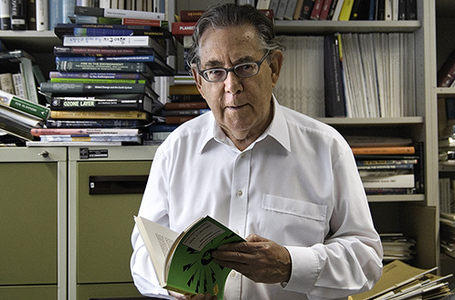Conference in Honor of the Atmospheric Chemist Paul Crutzen
Symposium "The Anthropocene" - Distinguished experts from all over the world congratulate the Nobel Prize winner from Mainz on his 80th birthday
In honor of its emeritus director Paul Crutzen, the Max Planck Institute for Chemistry and the Federal Minstry of Education and Research (BMBF) is hosting a symposium entitled: “The Anthropocene” to be held at the Kurfürstliche Schloss in Mainz on December 2, 2013. Leading researchers such as the Nobel Prize winner Mario Molina, the former German Federal Minister of the Environment Klaus Töpfer, the former Chairwoman of the World Climate Council Susan Solomon, the President of the American Academy of Sciences Ralph Cicerone and the climatologists Hartmut Graßl and Veereabhadran Ramanathan will present their views on the term “Anthropocene” as part of the conference. Amongst the political speakers are Doris Ahnen, Rhineland-Palatinate Minister for Education, Research, Further Education and Culture and Dr. Georg Schütte, State Secretary, Federeal Ministry of Education and Research.

December 2nd, 2013, 9 – 18.30 Uhr
Kurfürstliches Schloss Mainz
Peter-Altmeier-Allee 1
55116 Mainz
Germany
Paul J. Crutzen received the Nobel Prize for Chemistry 18 years ago together with Mario J. Molina and F. Sherwood Rowland. The Nobel Committee honored him for his pioneering work, which resulted in the clarification of the ozone hole. At the age of 80 years, the atmospheric researcher and Nobel laureate Paul J. Crutzen is now devoted to the question of how man impacts nature and permanently changes it.
Paul Crutzen, with his creative mind, has always had a clear perspective of the future without losing sight of the past. Over ten years ago this caused him to suggest a new term for an age that is dominated by humans. The “Anthropocene” sees man as a factor that irrevocably changes the geological, biological and atmospheric processes on Earth. This means that man is specifically responsible for the further development of our planet.
An always active mind
In 1980, Paul Crutzen became Director at the Max Planck Institute for Chemistry in Mainz. As the successor to Christian Junge he headed the department “Atmospheric Chemistry” for twenty years, before retiring in 2000. On the occasion of his round birthday on December 3, the honorary citizen of Mainz, wished for a scientific view into the future instead of a review of his own life.
The scientific symposium on December 2, in Mainz, is just what he had in mind. The English-language conference aims to collect important thought-provoking impulses from a wide variety of fields and to point out important developments or problems. Participants can look forward to a varied and certainly inspiring program.
A total of ten high-ranking researchers will present their thoughts on this field in the Kurfürstliches Schloss (Palace of Counts Elector) in Mainz on December 2, 2013 from 9 a.m. to 6:30 p.m.
Tributes
- Wolfgang Schön, Vice President Max Planck Society
- Doris Ahnen, Rhineland-Palatinate Minister for Education, Research, Further Education and Culture
- Georg Schütte, State Secretary, Federeal Ministry of Education and Research
- Michael Müller, Former Parliamentary State Secretary
- Bernd Schmidbauer, Former Minister of State
Scientific Speakers
- Mario Molina, University of California in San Diego, USA
- Susan Solomon, Massachusetts Institute of Technology, USA
- Veerabhadran Ramanathan, Scripps Institution of Oceanography, University of California, San Diego, USA
- Henning Rodhe, University of Stockholm, Sweden
- Ralph Cicerone, National Academy of Science, USA
- Jack Fishman, Saint Louis University, USA
- John Burrows, University of Bremen, Germany
- Hartmut Grassl, Max Planck Institute for Meteorology, Germany
- Klaus Töpfer, Institute for Advanced Sustainability Studies, Germany
- Meinrat O. Andreae, Max Planck Institute for Chemistry, Germany
